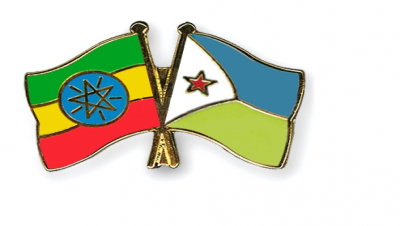
Djibouti’s economy and 85% of its gross domestic product rely on the service sector, which includes port, logistics and related services. This sector revolves around the country’s strategic location as a Red Sea transit point on the world’s busiest shipping lanes connecting Europe, the Middle East and Asia.
But this could all be disrupted by changes in the economy of its biggest customer, Ethiopia. Djibouti has provided the principal maritime harbour for imports and exports to and from landlocked Ethiopia since 1999.
Ethiopia relies on Djibouti’s port and transport-related infrastructure for 95% of its maritime trade. According to the World Bank, in 2013 85% of Djibouti’s port activities derived from Ethiopia’s import and export transactions. Not much has changed since, with Ethiopia contributing substantially to Djibouti’s overall economic growth.
Any disruption in Ethiopia’s economy will hurt Djibouti. At the same time, Djibouti’s stability is critical to Ethiopia’s economic well-being, indicating the interdependence of the two Horn of Africa countries, both economically and regarding security. Given their ties, two regional developments could damage Djibouti’s economy if they slow down financial contact with Ethiopia.
The first potential problem is political instability in Ethiopia. Beyond the adverse effects of COVID-19 on Ethiopia’s trade in 2020, the political disruption associated with recent social unrest is bound to weaken its economy, at least in the short term.
This will, in turn, dampen Djibouti’s economic prospects in the short term. According to the International Monetary Fund, Djibouti experienced a 1% slowdown in economic performance in 2020, but is predicted to grow by 6% in the coming years. However, this forecast is based on Ethiopia’s rapid expansion in trade and private investment, a difficuly dynamic to rely on, given the country’s issues. Concerns about the effects on Djibouti’s economy are by the country’s Finance Minister Ilyas Dawaleh.
The second regional development that could affect Djibouti relates to Ethiopia’s policy of diversifying its port connections. Ethiopia is aware of the danger of relying on one outlet, as exemplified in the 1990s when it went to war with its neighbour Eritrea – then Ethiopia’s main route to the sea. This 1998–2000 war led to Djibouti emerging as Ethiopia’s primary outlet for its trade.
The Ethiopian government has bought a 19% stake in Berbera Port in Somaliland to diversify its maritime outlets. Developments are also underway to use the Ports of Massawa and Assab in Eritrea. And Ethiopia has expressed interest in Port Sudan in Sudan.
Ethiopia’s rapprochement with Eritrea and the opportunity to use the latter’s harbours could help Ethiopia diversify its sea outlets. The construction of the Melodoni-Manda-Bure road project, which connects Ethiopia with Eritrea’s port of Assab and serves as an alternative route to Ethiopia’s foreign market, officially started in January.
Berbera Port in Somaliland is another option. In March 2018, Dubai Ports World, Somaliland’s administration and Ethiopia signed an agreement for shared port management, with Ethiopia having a 19% share. The port is under development and expansion, with a road being constructed between the port and Ethiopia.
Djibouti currently retains a significant infrastructural advantage over its potential port competitors in the region. But its port services have become expensive over the years and may lead to Ethiopia seeking alternative options. This could impact Djibouti’s economic performance in the medium to longer terms.
